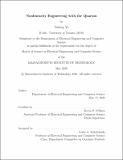Nonlinearity engineering with the Quarton
Author(s)
Ye, Yufeng,S.M.Massachusetts Institute of Technology.
Download1191906022-MIT.pdf (1.170Mb)
Other Contributors
Massachusetts Institute of Technology. Department of Electrical Engineering and Computer Science.
Advisor
Kevin P. O'Brien.
Terms of use
Metadata
Show full item recordAbstract
In this thesis, we show the principles and applications of a new technique we call "nonlinearity engineering" using a recent superconducting qubit, the Quarton. In traditional nonlinear optics, nonlinear effects are usually weak perturbations to linear interactions. Similarly, microwave quantum optics with superconducting circuits relies on the Josephson junction for a negative Kerr nonlinearity that is much weaker than its associated linear energy. Recently, a new superconducting qubit known as the "Quarton" can offer non-perturbatively strong nonlinearity. Here, we demonstrate the general principle of using the Quarton's positive Kerr and zero linear energy to perform nonlinearity engineering, i.e. the selective design of the nonlinear properties of microwave artificial atoms, metamaterials, and photons in a manner that (to the best of our knowledge) has no optical analog. We show that for Quarton mediated light-matter coupling, the Quarton can erase or amplify the nonlinearity of artificial atoms and metamaterials. Without nonlinearity, matter behaves light-like and we find (to our best knowledge) the first theoretical demonstration of cross-Kerr between linear microwave photon modes. We extend these fundamental results and provide a practical application by designing a Josephson traveling wave photon detector
Description
Thesis: S.M., Massachusetts Institute of Technology, Department of Electrical Engineering and Computer Science, May, 2020 Cataloged from the official PDF of thesis. Includes bibliographical references (pages 59-62).
Date issued
2020Department
Massachusetts Institute of Technology. Department of Electrical Engineering and Computer SciencePublisher
Massachusetts Institute of Technology
Keywords
Electrical Engineering and Computer Science.